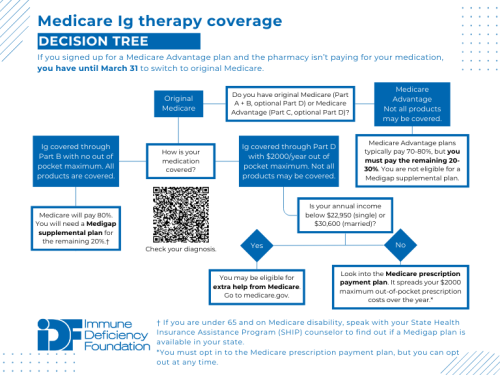
-
Understanding primary immunodeficiency (PI)

Understanding PI
The more you understand about primary immunodeficiency (PI), the better you can live with the disease or support others in your life with PI. Learn more about PI, including the various diagnoses and treatment options.
-
Living with PI
-
Addressing mental health
-
Explaining your diagnosis
- General care
- Get support
- For parents and guardians
-
Managing workplace issues
- Navigating insurance
-
Traveling safely

Living with PI
Living with primary immunodeficiency (PI) can be challenging, but you’re not alone—many people with PI lead full and active lives. With the right support and resources, you can, too.
-
Addressing mental health
-
Get involved

Get involved
Be a hero for those with PI. Change lives by promoting primary immunodeficiency (PI) awareness and taking action in your community through advocacy, donating, volunteering, or fundraising.
-
Advancing research and clinical care
-
Grants
-
IDF surveys
-
Participating in clinical trials
-
Diagnosing PI
-
Consulting immunologist
-
Clinician education

Advancing research and clinical care
Whether you’re a clinician, researcher, or an individual with primary immunodeficiency (PI), IDF has resources to help you advance the field. Get details on surveys, grants, and clinical trials.
-
Grants

What is Medigap?
Medigap plans are also known as Medicare supplemental insurance plans. Traditional Medicare (Part A and Part B) includes substantial cost-sharing responsibilities (deductibles, copays, and coinsurance) for beneficiaries and does not limit out-of-pocket costs. Medigap plans are standardized, private insurance plans designed to help beneficiaries pay their Medicare out-of-pocket costs. Some Medigap plans also limit annual out-of-pocket costs.
Individuals on Medicare Advantage plans (Part C) or who have other supplemental insurance, such as employer-based coverage, are not eligible to purchase Medigap plans.
Why is Medigap access a problem?
The Affordable Care Act (ACA) prohibits ‘medical underwriting,’ which is the practice of basing policy premiums or denying coverage altogether because of pre-existing conditions. However, Medigap plans are not covered by ACA. Outside of certain very specific windows set by federal minimum guidelines, Medigap plans can use a beneficiary’s age, health, gender, marital status, smoking history, and zipcode to set premiums or deny coverage. For many people, the only time they can enroll in a Medigap plan without being subject to medical underwriting is within the first six months of their initial enrollment in Medicare Part B after turning 65.
Because Medigap plans are regulated by states, some states have prohibited medical underwriting in additional situations. For example, Massachusetts mandates an open enrollment period without medical underwriting for all Medigap plans every year.
However, many individuals are effectively boxed out of Medigap coverage if their states have not enacted additional medical underwriting protections. This includes beneficiaries who:
- Are under 65 years of age but do not qualify for Medicaid.
- Are 65+ and miss the one-time, 6-month open enrollment period after enrolling in Medicare Part B.
- Switch from a Medicare Advantage plan to traditional Medicare after their first year of Medicare eligibility.
- Want to switch from one Medigap plan to another.
While medical underwriting in Medigap plans is an issue for many, beneficiaries who are under 65 years of age are hit particularly hard. These beneficiaries receive Medicare because they meet the requirements to receive Social Security disability benefits. By definition, they have significant pre-existing medical conditions. Because of medical underwriting, there are no Medigap plans available to beneficiaries under 65 in many states, while in others, Medigap plans for this population are very expensive. Furthermore, federal rules prohibit Medicare beneficiaries from receiving copay assistance to offset medication costs.
What is IDF doing?
The Immune Deficiency Foundation supports the Close the Medigap Act of 2023 (H.R. 35), which would prohibit medical underwriting at all times in Medigap plans, bringing them into line with ACA-regulated health insurance plans.
The foundation also supports state legislation that prohibits Medigap medical underwriting in additional situations, particularly for those on Medicare under age 65.
Sign up for Action Alerts
When we need policymakers to hear the PI community’s perspective, you will receive an Action Alert by email. Customize each alert with your information and hit send. It's that easy.
Sign up todayNavigating health insurance
IDF’s guide to health insurance for people with PI provides basic information on plan options, the appeals process for denied claims, and a glossary of terms.
Learn about insuranceLatest health insurance resources
Sign up for updates from IDF
Receive news and helpful resources to your cell phone or inbox. You can change or cancel your subscription at any time.





The Immune Deficiency Foundation improves the diagnosis, treatment, and quality of life for every person affected by primary immunodeficiency.
We foster a community that is connected, engaged, and empowered through advocacy, education, and research.
Combined Charity Campaign | CFC# 66309




